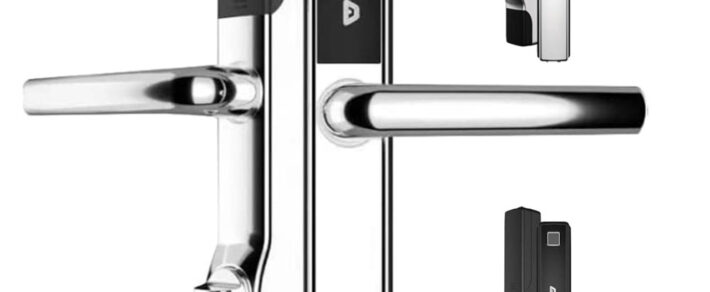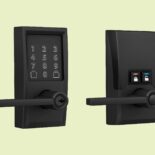The Rise of the Smart Locks - Securing Homes in the Digital Age
In today’s rapidly evolving technological world, smart locks are becoming an essential tool for home security. These innovative devices allow homeowners to lock and unlock their doors using smartphone apps, keypads, or even voice commands. As part of the broader trend towards smart home automation, the smart lock offers enhanced security and unmatched convenience.
This article explores the rise of the smart lock, its key features, and how it is transforming the way we secure our homes.
What Is a Smart Lock?
Keyless Entry and Digital Access
A smart lock is an electronic device that allows for keyless entry, eliminating the need for traditional keys. It provides digital access via smartphone apps, Bluetooth, or Wi-Fi. Many smart locks offer remote control capabilities, making them an integral part of modern home security systems.
Smart Home Integration
One of the greatest advantages of a smart lock is its ability to integrate seamlessly with other smart home systems. Many models work with Amazon Alexa, Google Home, and Apple HomeKit, allowing users to lock or unlock their doors using voice commands. This feature enhances both security and convenience in a connected home.
Why Are Smart Locks So Popular?
Convenience of Keyless Entry
Smartphone Control
A smart lock allows you to manage your home’s access directly from your smartphone. This means you no longer need to carry physical keys, adding a layer of convenience, especially for those who are often on the go.
Bluetooth and Wi-Fi Connectivity
Many smart locks operate through Bluetooth or Wi-Fi, offering remote access to your home. For example, with a Wi-Fi-enabled smart lock, you can lock or unlock your door even when you're not physically present, giving you control no matter where you are.
Enhanced Security Features
Access Logs and Monitoring
A smart lock often provides detailed access logs and real-time monitoring, allowing you to see who enters your home and when. This is particularly useful for keeping track of visitors, service providers, or family members.
Biometric Security
Some smart locks come equipped with biometric security features like fingerprint recognition. This ensures that only authorised individuals can enter your home, adding an extra layer of protection.
Key Features of Smart Locks
Auto-Locking
Many smart locks feature an auto-locking function that automatically secures your door after a specified amount of time. This feature ensures that your home remains locked, even if you forget to do it yourself.
Temporary Access Codes
A smart lock allows you to generate temporary access codes for guests, family members, or service providers. These codes can be set to expire after a specific period, giving you full control over who can enter your home and for how long.
Geofencing Technology
Some smart locks come equipped with geofencing capabilities, allowing the lock to automatically secure or unlock your door based on your location. This hands-free feature ensures smooth entry and exit, as the lock responds to the proximity of your smartphone.
Are Smart Locks Secure?
Encryption and Cybersecurity
While no lock is entirely immune to threats, modern smart locks use strong encryption protocols to protect against cyberattacks. Regular software updates and the use of robust passwords further strengthen the security of your smart lock.
Backup Options
In case of a power outage or technical failure, most smart locks offer backup options, such as a traditional key or battery-powered override. These features ensure that you can still access your home, even if the technology temporarily fails.
Potential Downsides of Smart Locks
Higher Cost
A smart lock typically costs more than a traditional lock, but the added convenience, features, and security often make it a worthwhile investment for homeowners looking to enhance their security system.
Dependence on Technology
While a smart lock offers many benefits, it does rely heavily on technology. If the power goes out or you lose your internet connection, remote access might be temporarily unavailable. However, most devices provide solutions, such as Bluetooth connectivity or manual key backups.
FAQ on Smart Locks
Q: How does a smart lock work?
A smart lock operates by using Bluetooth, Wi-Fi, or Z-Wave to communicate with your smartphone or home automation system. Some models also feature biometric security or keypads for added access options.
Q: Are smart locks safe?
Yes, modern smart locks use strong encryption and often offer two-factor authentication, making them highly secure. However, as with any digital device, it’s important to keep software up to date and use strong passwords.
Q: What are the best smart locks?
Top brands offering smart locks include August, Yale, and Schlage. Each offers a variety of models with features such as biometric security, cloud-based monitoring, and temporary access codes.
Conclusion
The smart lock is fast becoming a key component of smart home automation. With features like keyless entry, biometric security, and remote access, the smart lock offers significant improvements over traditional locks. Although it may come with some challenges, such as cost and reliance on technology, its benefits in terms of convenience and enhanced security make it a strong choice for today’s homeowners.
As smart home technology continues to evolve, the smart lock is likely to play an even greater role in protecting homes. Whether you're seeking a Wi-Fi-enabled lock or one with geofencing technology, there’s a smart lock to suit every security need.






